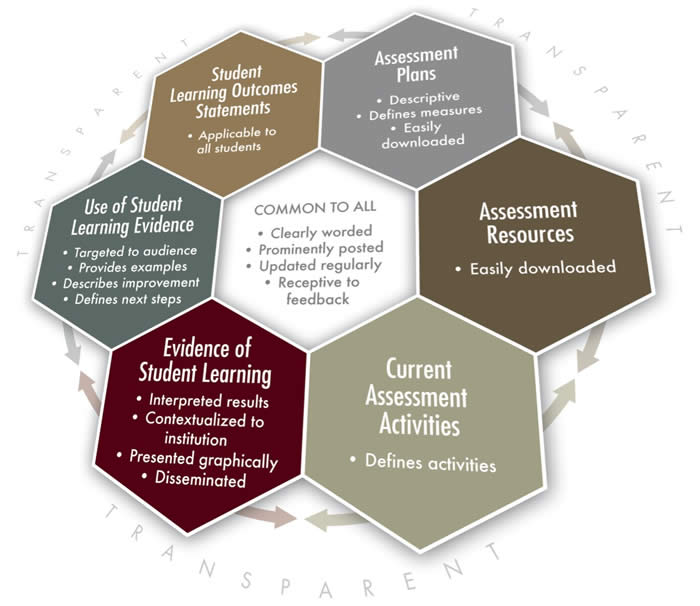
The National Institute for Learning Outcomes Assessment (NILOA) developed the above Transparency Framework to aid colleges in sharing their accountability efforts with the public. Below is information on how Appalachian is currently addressing each of the six components of the framework.

All undergraduate, graduate, and certificate programs at Appalachian have created and posted student learning outcomes. These outcomes represent what a student should be able to do as a result of successfully completing the program. Student performance on these outcomes are routinely assessed by program faculty as a way of informing programmatic improvement efforts. The list of current student learning outcomes by program can be found at: https://academicaffairs.appstate.edu/resources/student-learning-outcomes.
In addition, Appalachian has established student learning goals for general education which are assessed at many levels.

All academic programs, educational support and administrative units at Appalachian are expected to have assessment plans. Annual assessment plans include the goal and outcome being assessed during the coming year, description of the assessment method, and the numeric criterion set by the program. Assessment plans for each academic/fiscal year are due in Xitracs by October 1.

The Office of Institutional Research, Assessment and Planning (IRAP) provides assessment resources for all members of the campus community. The IRAP website hosts many resources on assessment and overall institutional effectiveness. IRAP also provides workshops and one-on-one consultation with faculty and staff regarding assessment. In addition, each academic college or school has a representative on the University Academic Assessment Council (UAAC). The representative on UAAC serves as the primary assessment resource for the college or school and often chairs a college-level assessment committee, which serves as a resource for faculty and staff within the respective college.

All academic, administrative and educational support units are expected to complete annual assessment reports to share assessment activities over the past year. Assessment reports from the previous academic or fiscal year are due in Xitracs on October 1. Example assessment reports can be found here.
Assessment of the General Education program at Appalachian happens at many levels. At the institution level, Appalachian periodically assesses goals of the general education program through participation in standardized tests such as the Collegiate Learning Assessment or the ETS HEIghten Outcomes Assessment. In addition, Appalachian asks degree programs to link their degree program level assessment results to general education goals where applicable. Most recently, the General Education program has adopted an annual General Education Assessment Summit to assess the goals of general education. The General Education Assessment Summit is a two-day event where faculty apply a rubric to artifacts collected from general education courses to assess one of the general education goals.

All academic units share results of assessment activities on an annual basis. Example assessment reports from academic programs can be found here. Institutional performance indicators over recent years include the Graduating Senior Survey, the National Survey of Student Engagement, the Collegiate Learning Assessment, ETS HEIghten Outcomes Assessment, and the Global Learning Survey.

Academic programs across campus use results from student learning outcomes assessment to make changes to their curriculum, policies, and procedures. Here are a few examples of the use of evidence of student learning :
GR - Business Administration - Based on 2014-15 ETS Major Field Test results, the MBA program made a tutor available to students, formulated study groups and worked on improving admissions criteria all in an effort to increase scores.
UG - Criminal Justice - Based on several cycles of assessment results, faculty in Government and Justice Studies found that students in their undergraduate criminal justice major needed to improve their understanding and usage of APA style. The program added a requirement that all faculty teaching CJ 3100: Writing in Criminal Justice must rquire that every student correctly execute APA style to pass the class. Also, the department held a workshop for faculty teaching the writing course on improving instruction on APA style in the writing course.
UG - Fermentation Sciences - In 2015-16, after unsatisfactory assessment results in written communications, the Fermentation Sciences faculty made several changes to the program of study, including adding a 2000-level course in writing for majors and adding prerequisites for upper-level courses.
Results for institution-level assessment are shared with the appropriate groups on campus including the General Education Council, University Academic Assessment Council, Dean's Council, and the QEP Council. Where applicable, department-level results are sent to department chairs to share with their faculty and program directors.
Reference: National Institute for Learning Outcomes Assessment. (2011). Transparency Framework. Urbana, IL: University of Illinois and Indiana University, National Institute for Learning Outcomes Assessment (NILOA). Retrieved from:http://www.learningoutcomeassessment.org/TransparencyFrameworkIntro.htm